2020 Summer Olympics
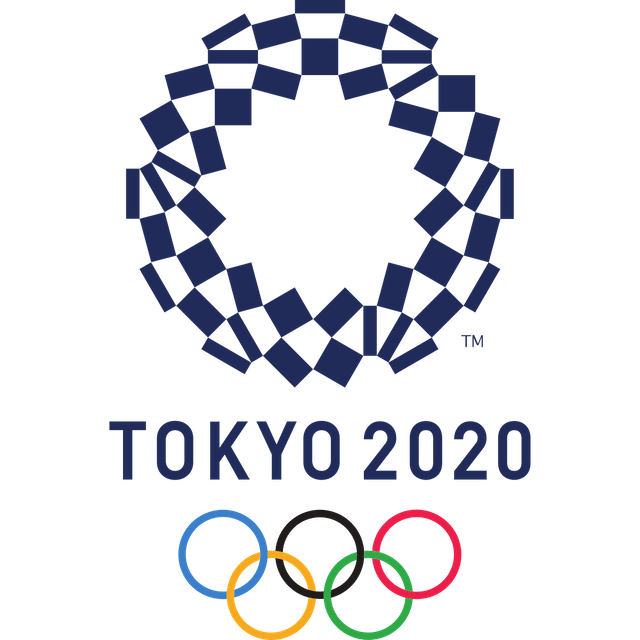
2020 Summer Olympics

| Host city | Tokyo, Japan | ||
|---|---|---|---|
| Motto | TBD | ||
| Nations | 206 (expected) | ||
| Athletes | 11,091 (expected) | ||
| Events | 339 in 33 sports (50 disciplines) | ||
| Opening | 24 July | ||
| Closing | 9 August | ||
| Stadium | New National Stadium | ||
| Summer | |||
| |||
| Winter | |||
| |||
The 2020 Summer Olympics (2020年東京オリンピック, Nisen Nijū-nen Tōkyō Orinpikku),[1] officially known as the Games of the XXXII Olympiad (Japanese: 第三十二回オリンピック競技大会, Hepburn: Dai Sanjūni-kai Orinpikku Kyōgi Taikai)[2] and commonly known as Tokyo 2020, is an upcoming international multi-sport event that is scheduled to take place from 24 July to 9 August 2020 in Tokyo, Japan, with preliminary events in some sports beginning on 22 July.
Tokyo was selected as the host city during the 125th IOC Session in Buenos Aires, Argentina on 7 September 2013.[3] This Olympiad will mark the return of the Olympics to Asia having hosted in 1964 (Tokyo), 1972 (Sapporo) and 1998 (Nagano) all in Japan, and 2018 Winter Olympics in Pyeongchang County, South Korea. The 2022 Winter Olympics will be held in Beijing, China.
This Olympiad will see the introduction of new and additional competitions at the Summer Olympics, including 3x3 basketball, freestyle BMX and Madison cycling, as well as further mixed events. Under new IOC policies that allow host organizing committees to add to that Olympiad program to augment the permanent "core" Olympics This Olympiad will see karate, sport climbing, surfing and skateboarding make their Olympic debuts. There will be the return of baseball and softball, both removed from the summer program after 2008).
| Host city | Tokyo, Japan | ||
|---|---|---|---|
| Motto | TBD | ||
| Nations | 206 (expected) | ||
| Athletes | 11,091 (expected) | ||
| Events | 339 in 33 sports (50 disciplines) | ||
| Opening | 24 July | ||
| Closing | 9 August | ||
| Stadium | New National Stadium | ||
| Summer | |||
| |||
| Winter | |||
| |||
Bidding process
Tokyo, Istanbul, and Madrid were the three candidate cities. The applicant cities of Baku (Azerbaijan) and Doha (Qatar) were not promoted to candidate status. A bid from Rome was withdrawn.
Host city selection
The IOC voted to select the host city of the 2020 Summer Olympics on 7 September 2013 at the 125th IOC Session at the Buenos Aires Hilton in Buenos Aires, Argentina. An exhaustive ballot system was used. No city won over 50% of the votes in the first round, and Madrid and Istanbul were tied for second place. A run-off vote between these two cities was held to determine which would be eliminated. In the final vote, a head-to-head contest between Tokyo and Istanbul, Tokyo was selected by 60 votes to 36, as it got at least 49 votes needed for a majority.
Template:2020 Olympic host city selection
Development and preparation
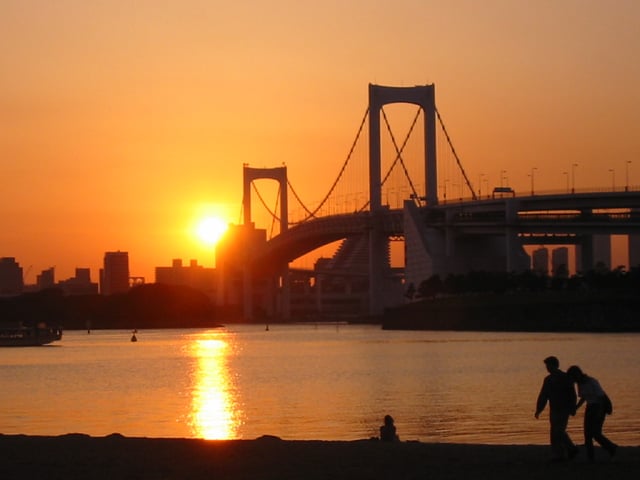
View of the Rainbow Bridge from Odaiba Marine Park
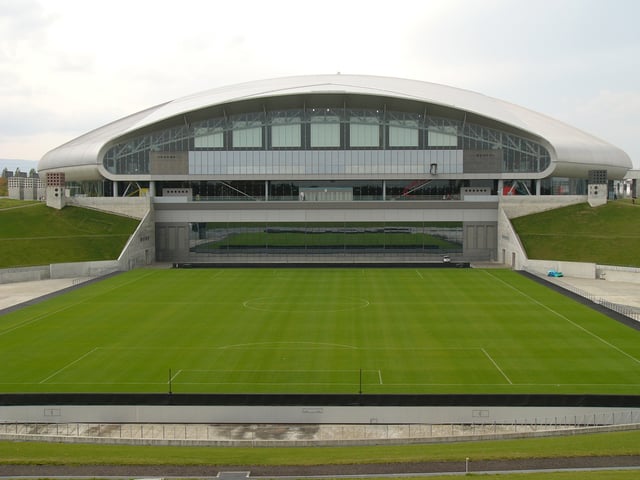
The Sapporo Dome in Sapporo
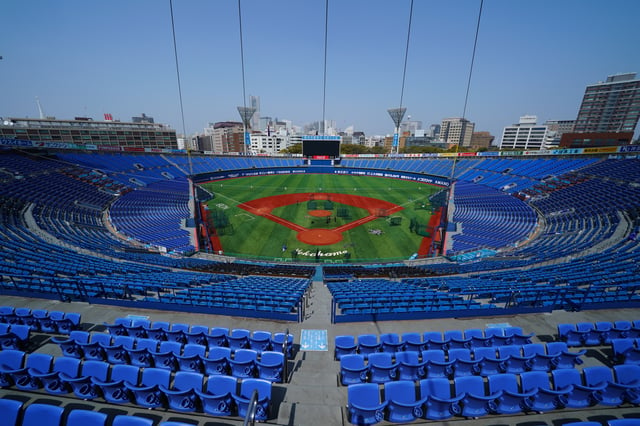
Yokohama Stadium – Baseball
The Tokyo Metropolitan Government set aside a fund of 400 billion Japanese yen (over 3.67 billion USD) to cover the cost of hosting the Games. The Japanese government is considering increasing slot capacity at both Haneda Airport and Narita International Airport by easing airspace restrictions. A new railway line is planned to link both airports through an expansion of Tokyo Station, cutting travel time from Tokyo Station to Haneda from 30 minutes to 18 minutes, and from Tokyo Station to Narita from 55 minutes to 36 minutes; the line would cost 400 billion yen and would be funded primarily by private investors, but East Japan Railway Company (East JR) is planning a new route near Tamachi to Haneda Airport.[4] Funding is also planned to accelerate completion of the Central Circular Route, Tokyo Gaikan Expressway and Ken-Ō Expressway, and to refurbish other major expressways in the area.[5] There are also plans to extend the Yurikamome automated transit line from its existing terminal at Toyosu Station to a new terminal at Kachidoki Station, passing the site of the Olympic Village, although the Yurikamome would still not have adequate capacity to serve major events in the Odaiba area on its own.[6]
Venues and infrastructure
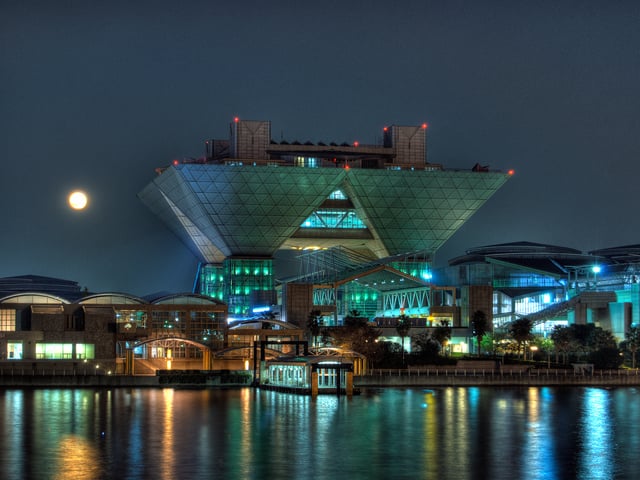
The Tokyo Big Sight Conference Tower will be used as the IBC/MPC complex
In February 2012, a 100 billion yen upgrade was announced to be made to the National Stadium in Tokyo, the central venue for the 1964 Summer Olympics, for the 2019 Rugby World Cup and the 2020 Olympics.[9] In November 2012, the Japan Sport Council announced a design competition was to be launched. Of 46 finalists, Zaha Hadid Architects was awarded the project that included dismantling the original stadium, and expanding its capacity from 50,000 to about 80,000.[10] By May 2015, the site was cleared. In July 2015, Japanese Prime Minister Shinzō Abe announced that the original project was scrapped due to discontent in the revived project costs. A Kengo Kuma design was selected in the second competition that enabled the proposed stadium to temporarily configure to different capacities from 60,000 to 80,000, as does the Stade de France.[11] The project will not be completed by the original deadline for the 2019 Rugby World Cup.
In September 2016, a cost review of hosting the Olympics and Paralympics found that the original estimate would increase by four times. The solutions to reduce costs including moving venues outside the city of Tokyo.[12] In October 2018, the Board of Audit issued a report stating that the total cost of the venues could exceed US$25 billion.[13]
Of the 33 competition venues in Tokyo, 28 are within 8 kilometres (4.97 miles) of the Olympic Village. Eleven new venues are to be constructed.[14]
- Heritage Zone
Seven venues for nine sports will be located within the central business area of Tokyo, northwest of the Olympic Village. Several venues included reused of the 1964 Summer Olympics.
| Venue | Events | Capacity | Status |
|---|---|---|---|
| New National Stadium | Opening and closing ceremonies | 68,000 80,016 (Association football) | Under construction |
| Athletics | |||
| Football (finals) | |||
| Yoyogi National Gymnasium | Handball | 13,291 | Existing |
| Ryōgoku Kokugikan | Boxing | 11,098 | Existing |
| Tokyo Metropolitan Gymnasium | Table tennis | 10,000 | Existing |
| Nippon Budokan | Judo | 14,471 | Existing |
| Karate | |||
| Tokyo International Forum | Weightlifting | 5,012 | Existing |
| Imperial Palace Gardens | Athletics (marathon, race walk) | 5,000 seated, unlimited standing room along route | Temporary |
| Musashinomori Park[15] | Road cycling (start road races) | Temporary |
- Tokyo Bay Zone
There will be 13 venues for 15 sports located in the vicinity of Tokyo Bay, southeast of the Olympic Village, predominantly on Ariake, Odaiba and the surrounding artificial islands.
| Venue | Events | Capacity | Status |
|---|---|---|---|
| Kasai Rinkai Park | Canoeing (slalom) | 8,000 | Ready, built for the games |
| Oi Hockey Stadium | Field hockey | 15,000 | Under construction[16] |
| Tokyo Aquatics Centre | Aquatics (swimming, diving, synchronized swimming) | 15,000 | Under construction |
| Tokyo Tatsumi International Swimming Center | Water polo[17] | 3,635 | Existing |
| Yumenoshima Park | Archery | 7,000 | Under construction[18] |
| Ariake Arena | Volleyball | 15,000 | Under construction |
| Olympic BMX Course | BMX cycling | 6,000 | Under construction |
| Skateboarding | |||
| Ariake Gymnastics Centre | Gymnastics (artistic, rhythmic, trampoline) | 10,000 | Temporary |
| Ariake Coliseum | Tennis | 20,000 = 10,000 centre court; 5,000 court 1; 3,000 court 2; 2,000 match courts (8x250) | Existing, renovated |
| Odaiba Marine Park | Triathlon | 5,000 seated, unlimited standing room along route | Existing with temporary stands |
| Aquatics (marathon swimming) | |||
| Shiokaze Park | Beach volleyball | 12,000 | Temporary |
| Central Breakwater and Sea Forest Waterway | Equestrian (eventing) | 20,000 | Existing with temporary infrastructure |
| Rowing | |||
| Canoeing (sprint) | |||
| Aomi Urban Sports Venue | 3x3 basketball | 5,000 | Temporary |
| Sport climbing |
- Outlying venues
Twelve venues for 16 sports will be situated farther than 8 kilometres (5 miles) from the Olympic Village.
| Venue | Events | Capacity | Status |
|---|---|---|---|
| Camp Asaka | Shooting | Existing, renovated | |
| Musashino Forest Sports Plaza | Modern pentathlon (fencing) | 10,000 | Ready, built for the games |
| Badminton[19] | |||
| Tokyo Stadium | Football | 49,970[20] | Existing |
| Modern pentathlon (excluding fencing) | |||
| Rugby sevens | |||
| Saitama Super Arena | Basketball | 22,000[21] | Existing |
| Enoshima | Sailing | 10,000[22] | Existing with temporary stands |
| Makuhari Messe | Fencing | 6,000 | Existing with temporary stands |
| Taekwondo | |||
| Wrestling | 8,000[23] | ||
| Baji Koen | Equestrian (dressage, jumping)[24] | Existing with temporary stands | |
| Kasumigaseki Country Club | Golf | 30,000[25][26] | Existing with temporary stands |
| Izu Velodrome | Track cycling | 5,000[27] | Existing, expanded |
| Izu Mountain Bike Course | Mountain biking[28] | ||
| Yokohama Stadium | Baseball | 30,000[29] | Existing |
| Softball | |||
| Fukushima Azuma Baseball Stadium | Baseball (opening match) | 30,000 | Existing, renovated |
| Softball (opening match) [30] | |||
| Fuji International Speedway | Road cycling (finish road races, time trial) | Existing |
- Football venues
| Venue | Location | Events | Matches | Capacity | Status |
|---|---|---|---|---|---|
| International Stadium Yokohama[31] | Yokohama | Men's and Women's preliminaries, quarter-final, Women's semi-final and Men's final | 10 | 70,000 | Existing |
| Tokyo Stadium | Tokyo | Men's and Women's opening round | 4 | 49,000 | Existing |
| Saitama Stadium | Saitama | Men's and Women's preliminaries and quarter-final, Men's semi-final and 3rd place play-off | 11 | 62,000 | Existing |
| Miyagi Stadium | Sendai | Men's and Women's preliminaries and quarter-final | 10 | 49,000 | Existing |
| Kashima Soccer Stadium | Kashima | Men's and Women's preliminaries, quarter-final and semi-final, Women's 3rd place play-off | 10 | 40,728 | Existing |
| Sapporo Dome | Sapporo | Men's and Women's preliminaries | 10 | 42,000 | Existing |
| New National Stadium | Tokyo | Women's final | 2 | 60,012 | Under construction |
- Non-competition venues
| Venue | Events |
|---|---|
| Imperial Hotel, Tokyo | IOC hotel |
| Harumi Futo | Olympic Village |
| Tokyo Big Sight | Media Press Center (MPC) |
| International Broadcast Center (IBC) |
Security
In December 2018, the Japanese government chose to ban drones from flying over venues being used for the Olympic and Paralympic Games. A ban was also imposed for the 2019 Rugby World Cup.[32]
Volunteers
Applications for volunteering at the 2020 Olympic and Paralympic Games were accepted from 26 September 2018. By 18 January 2019, a total of 204,680 applications had been received by the organising committee.[33] Interviews to select the requisite number of volunteers began in February 2019 and training will take place in October 2019.[34] The volunteers at the venues will be known as "Field Cast" and the volunteers in the city will be known as "City Cast"; these names were chosen from a shortlist of four from an original 149 pairs of names. The other shortlisted names were "Shining Blue" & "Shining Blue Tokyo", "Games Anchor" & "City Anchor", and "Games Force" & "City Force". The names were chosen by the people who had applied to be volunteers at the Games.[35]
Medals
In February 2017, the Tokyo Organizing Committee announced an electronics recycling program in partnership with Japan Environmental Sanitation Center and NTT docomo, soliciting donations of electronics (such as mobile phones) to be reclaimed as materials for the medals. Aiming to collect 8 tonnes of metals to produce the medals for the Olympic and Paralympic Games, collection boxes were deployed at public locations and NTT docomo retail shops that April.[36][37] A design competition for the medals launched in December 2017.[38]
In May 2018, the organizing committee reported that they had obtained half the required 2,700 kilograms of bronze, but that they were struggling to obtain the required amount of silver: although silver and bronze medals purely utilize their respective materials, IOC requirements mandate that gold medals utilize silver as a base.[39] The collection of bronze was completed in November 2018, with the remainder estimated to be complete by March 2019.[40]
Torch relay
After its traditional lighting in Greece, the 2020 Summer Olympics torch relay will begin in Naraha, Fukushima on 26 March 2020.[44]
Ticketing
The opening ceremony tickets will range from 12,000 to 300,000 yen, with a maximum price of 130,000 yen for the finals of athletics.[45] The average price of all the Olympic tickets is 7,700 yen. 50% of the tickets will be sold for 8,000 yen or less. A symbolic ticket price of 2,020 yen will be for families, groups resident in Japan and in conjunction with a school programme. Tickets will be sold through 40,000 shops in Japan and by mail order to Japanese addresses through the Internet.[46] International guests will need to visit Japan during the sales period or arrange for tickets through a third party, such as a travel agent.[47]
The Games
Sports
The games will feature 339 events in 33 different sports, encompassing 50 disciplines. Alongside the five new sports that will be introduced in Tokyo, there will be fifteen new events within existing sports, including 3x3 basketball, freestyle BMX and Madison cycling, and new mixed events in several sports.
In the list below, the number of events in each discipline is noted in parentheses.
Aquatics
Artistic swimming (2)
Diving (8)
Swimming (37)
Water polo (2)
Archery (5)
Athletics (48)
Badminton (5)
Baseball (1)
Softball (1)
Basketball Basketball (2) 3x3 basketball (2)
Boxing (13)
Canoeing Slalom (4) Sprint (12)
Cycling BMX freestyle (2) BMX racing (2) Mountain biking (2) Road cycling (4) Track cycling (12)
Equestrian Dressage (2) Eventing (2) Jumping (2)
Fencing (12)
Field hockey (2)
Football (2)
Golf (2)
Gymnastics Artistic (14) Rhythmic (2) Trampoline (2)
Handball (2)
Judo (15)
Karate Kata (2) Kumite (6)
Modern pentathlon (2)
Rowing (14)
Rugby sevens (2)
Sailing (10)
Shooting (15)
Skateboarding (4)
Sport climbing (2)
Surfing (2)
Table tennis (5)
Taekwondo (8)
Tennis (5)
Triathlon (3)
Volleyball Volleyball (2) Beach volleyball (2)
Weightlifting (14)
Wrestling Freestyle (12) Greco-Roman (6)
- New sports
As part of a goal to control costs and ensure that the Olympics remain "relevant to sports fans of all generations", the IOC assessed the 26 sports contested at the 2012 Olympics, with the remit of dropping one sport and thus retaining 25 "core" sports to join new entrants golf and rugby sevens at the 2020 Games. This move would bring the total number of sports to 27, one less than the requirement of 28 for the 2020 Olympics programme, thus leaving a single vacancy that the IOC would seek to fill from a shortlist containing seven unrepresented sports as well as the sport that had been dropped from the 2012 Olympics programme.
On 12 February 2013, IOC leaders voted to drop wrestling from the "core" programme for the 2020 Games; this was a surprising decision to news outlets given that wrestling is from the ancient Olympic Games and part of the programme of the Modern Olympiad. The New York Times felt that the decision was based on the shortage of well-known talent and the absence of women's events in the sport.[50][51][52] Wrestling was duly added to the shortlist of applicants for inclusion in the 2020 Games, alongside the seven new sports that were put forward for consideration.[50]
On 29 May 2013, it was announced that three of the eight sports under consideration had made the final shortlist: baseball/softball, squash and wrestling.[53] The other five sports were rejected at this point: karate, roller sports, sport climbing, wakeboarding, and wushu.[54] On 8 September 2013, at the 125th IOC Session, wrestling was chosen to be included in the Olympic programme for 2020 and 2024. Wrestling secured 49 votes, while baseball/softball and squash received 24 votes and 22 votes respectively.[55]
Under new IOC policies that shift the Games to an "event-based" programme rather than sport-based, the host organizing committee can now also propose the addition of sports to the programme. This rule is designed to allow sports that are popular in the host country to be added to the programme, in order to improve local interest.[56] As a result of these changes, a list of eight sports was unveiled on 22 June 2015, consisting of: baseball/softball, bowling, karate, roller sports, sport climbing, squash, surfing, and wushu.[57] On 28 September 2015, the organisers submitted their shortlist of five proposed sports to the IOC: baseball/softball, karate, sport climbing, surfing, and skateboarding.[58] These five new sports were approved on 3 August 2016 by the IOC during the 129th IOC Session in Rio de Janeiro, Brazil, and will be included in the sports programme for 2020 only, bringing the total number of sports at the 2020 Olympics to 33.[59][60]
Test events
There will be 56 test events before the Olympic and Paralympic Games; they will be contested between June 2019 and June 2020, and will be completed before the start of the 2020 Summer Olympics. Several of the events are existing championships, but some will be newly created to serve as test events for the Olympics.[61][62]
It was announced in February 2019 that the test events would be under the banner "Ready, Steady, Tokyo." The Tokyo Organising Committee is responsible for 22 of the test events, with the remaining events to be arranged by national and international organisations. The first test event is World Sailing's World Cup Series held at Enoshima, and the last event is set to be the Tokyo Challenge Track Meet in May 2020.[63]
Participating National Olympic Committees
As of 26 September 2019, the following 124 NOCs are qualified.
| Participating National Olympic Committees |
|---|
|
Calendar
- *All times and dates useJapan Standard Time(UTC+9)*
Event scheduling
Per the historical precedent of swimming at the 2008 Summer Olympics in Beijing and figure skating at the 2018 Winter Olympics in Pyeongchang, swimming finals will be held in the morning to allow live primetime broadcasts in the Americas (due to the substantial fees NBC has paid for rights to the Olympics, the IOC has allowed NBC to have influence on event scheduling to maximize U.S. television ratings when possible; NBC agreed to a $7.75 billion contract extension on 7 May 2014, to air the Olympics through the 2032 games,[66] and is also one of the major sources of revenue for the IOC).[67] Japanese broadcasters were said to have criticized the decision, as swimming is one of the most popular Olympic events in the country.[68][69]
Marketing

Miraitowa (left), the official mascot of the 2020 Summer Olympics, and Someity (right), the official mascot of the 2020 Summer Paralympics
The official emblems for the 2020 Olympics and Paralympics were unveiled on 25 April 2016; designed by Asao Tokolo, who won a nationwide design contest, it takes the form of a ring in an indigo-coloured checkerboard pattern. The design is meant to "express a refined elegance and sophistication that exemplifies Japan".[70] The designs replaced a previous emblem which had been scrapped due to allegations that it plagiarized the logo of the Théâtre de Liège in Belgium. The Games' slogan is Discover Tomorrow (Japanese: 未来(あした)をつかもう, romanized: Ashita o tsukamō). While ashita literally means 'tomorrow', it is intentionally spelled as mirai 'future'.[71]
The official mascot of the 2020 Summer Olympics is Miraitowa, a figure with blue-checkered patterns inspired by the Games' official emblem. Its fictional characteristics include the ability to teleport.[72] Created by Japanese artist Ryo Taniguchi, the mascots were selected from a competition process which took place in late 2017 and early 2018. A total of 2,042 candidate designs were submitted to the Tokyo 2020 Organising Committee, which selected three pairs of unnamed mascot designs to present to Japanese elementary school students for the final decision.[73][74] The results of the selection were announced on 28 February 2018, and the mascots were named on 22 July 2018. Miraitowa is named after the Japanese words for "future" and "eternity", and Someity is named after someiyoshino, a type of cherry blossom. Someity's name also references the English phrase "so mighty".[75] The mascots are expected to help finance the Tokyo Games through merchandising and licensing deals.[76]
Concerns and controversies
On December 10, 2018, the French financial crimes office began an investigation of Tsunekazu Takeda, the president of the Japanese Olympic Committee, about a 2013 scheme to obtain votes from International Olympic Committee (IOC) members from Africa in support of Tokyo as host for the 2020 Olympics instead of Istanbul or Madrid.[77][78]
South Korea asked the International Olympic Committee to ban the Japanese Rising Sun Flag from the 2020 Summer Olympics, because the flag is a symbol of Japan’s imperialist past and recalls "historic scars and pain" for people of Korea just as the swastika "reminds Europeans of the nightmare of World War II".[79][80]
Russian and South Korean officials took issue with a map of the torch relay on the Games' official website, which depicted the disputed Liancourt Rocks (territory claimed by Japan but governed by South Korea) and Kuril Islands (territory claimed by Japan but governed by Russia since 1945) as part of Japan.[81]
Broadcasting
In the United States, the 2020 Summer Olympics will be broadcast by NBCUniversal properties, as part of a US$4.38 billion agreement that began at the 2014 Winter Olympics in Sochi.[85]
In Europe, this will be the first Summer Olympics under the IOC's exclusive pan-European rights deal with Eurosport, which began at the 2018 Winter Olympics and run through 2024. The rights for the 2020 Games cover almost all of Europe, excluding France due to an existing rights deal that will expire following these Games in favour of Eurosport, and Russia due to a pre-existing deal with a marketer through 2024.[86] Eurosport will sub-license coverage to free-to-air networks in each territory and other Discovery Inc.-owned channels. In the United Kingdom, these will be the last Games whose rights are primarily owned by the BBC, although as a condition of a sub-licensing agreement that will carry into the 2022 and 2024 Games, Eurosport holds exclusive pay television rights.[87][88][89]
